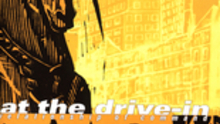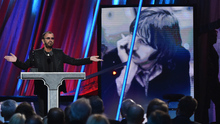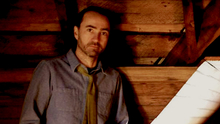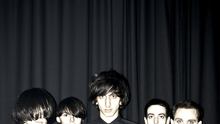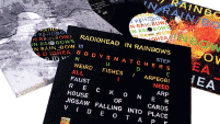“When I got it that Christmas I was like, ‘What!? What are you doing? This is no fun!’.”
The ‘most wonderful time of the year’ has certainly become daunting. You’re forced to endure rubbish Christmas adverts for the better part of three months. You’re constantly being harangued at every corner to buy, buy, buy the perfect gift and have to suffer through the consumer feeding frenzy formerly known as the yuletide spirit to do so. By the end, all you have to show for it is a pile of unwanted gifts, credit card debt, a battered liver and a serious case of heartburn. It’s enough to give even the most hardened of merry makers a major bout of depression.
Thankfully, Iceland’s Múm are here to help with a healthy dose of dreamy, electronic folk soundscapes just ripe for escaping holiday hell. With the departure of long-time vocalist Kristín Anna Valtýsdóttir in 2006, their latest long player, Go Go Smear the Poison Ivy, finds the band heading towards a more lively direction with a fresh roster of vocalists and support players. DiS recently sat down with band co-founder Gunnar Örn Tynes before their London Scala gig to get his thoughts on the holidays and, more importantly, the music.
Since it’s nearly Christmas, what’s your favourite part of the holiday season?
Ah, good food and mandatory relaxation.
How do you relax at Christmas?
You know, the usual. You eat a lot, sleep late, don’t do anything…
Watch stupid movies?
…watch stupid movies. You know you meet friends, you kind of… because it’s Christmas there’s nothing really else to do. Whatever you’re celebrating, it’s kind of the time where you’re dedicating your time to hedonism, basically, and I like that, especially with Iceland. We don’t see it so much when we’re travelling around, when we go to Spain or Italy or anywhere that is different or the opposite of Iceland. You can see how people spend so much time enjoying life and in Iceland it’s nothing like that. It’s just like, “Be happy with what you got”. There’s this feeling in society that’s about not wasting, you shouldn’t take too long breaks and you should work hard.
So Christmas is the one time you really let loose then?
Yeah.
What are you hoping to find underneath your tree on Christmas morning? Anything special?
(laughs) No, not really. I’m extremely un-materialistic so I… you know, I don’t collect anything or really own anything. So something homemade is always the way to touch my heart. You know, small and simple and personal, I think that’s the favourite. I usually try to give myself the Christmas presents I really want.
What was the worst present you ever received?
I remember when I was like 10 or 11, my parents gave me a comforter, you know, like a blanket, made from down. It’s really good, I still have it and it’s my favourite but when I got it that Christmas I was like, “What!? What are you doing? This is no fun”. But then a couple of months later I realised how good of a present it was. Seeing it though, and opening it, that was a big let down. Of course, I’m properly raised, so I didn’t cry or kick or anything. I was maybe a bit quiet at Christmas but I really appreciate it still.
What do you like doing for New Years?
I really relate to New Years. I enjoy Christmas but I get much more sentimental at New Years, it affects me much more. I’m not Christian; I’m not celebrating Christmas for religious reasons. Even if I believe in Jesus and believe he was a cool guy. I’m not going by the book on that. New Years is something that really matters to me. I think spending it with close friends is very important. I get very sentimental, New Years is my favourite.
Looking back on the year that was for Múm, is there anything you would change if you had the chance or are you happy with the band, the new record and everything that happened?
I wouldn’t change a thing. I’ve very happy about everything. It’s, of course, always a bit scary having to change or… not really having to change, but when change happens, embracing the change, adapting and realising that you have to do something different. It can be scary and it usually is a bit. But I wouldn’t have changed anything. It turned out beautifully. It’s been the best tour I’ve ever been on and it’s so much fun. It’s a really nice group of people. It’s strong. People are really challenging each other.
You’ve been a band though for roughly ten years now?
Yeah…
You and your writing partner Örvar (Þóreyjarson Smárason) have seen the band in that time grow from just the two of you to include the twins, and then you shrank again, and now you’ve once again expanded…
That’s not entirely true. There is a bit of a misunderstanding there. Our trumpet player, for example, played with us before the twins even came into the band. But he’s gradually been getting a bigger role, not because we gave it to him, because it’s in his feeling for… I don’t know, we don’t really set the rules. We kind of invite people to take part.
Video: 'They Made Frogs Smoke 'Til They Exploded'
- - -
So you’re not just one core unit with support players?
No, exactly. When we work with people or when we work together, everybody has freedom to do anything, but people are not necessarily used to that way of working. They’re used to, “I play a trumpet and you maybe tell me what to play and blah, blah, blah…”. Which we obviously do some of the time but we obviously want to get the most out of people and work with them. We don’t want to use people playing something that you can arrange with computers. Of course we do that as well, but the people are creatively working with us. We want everybody to feel that their input is valuable and that it can be tiny or huge. I think that is very important for creative collaboration. That’s kind of something that has flowered or grown over the years and I think with this album that it’s more than ever. People feel like they can contribute, and they are.
Do you still find creating music to be a rewarding act for you personally, or has it now become more of a job?
No, it’s totally a hobby or, you know, it’s the love of my life. In no way do I sense it as a job. Maybe when you’re touring and you’re stuck on this schedule that you can’t go out of. But even that doesn’t feel like a job in any way. It is hard work, even if people think it’s all fun. But it’s great. I love it.
With all the ups and downs over the years, have you ever had a moment when you wanted to give it up and pursue an entirely different kind of work?
No, not an entirely different kind of work. Not at all. I do a lot of recording and production as well. I mean, since discovering music at the age of 13 or younger, creatively speaking, I wouldn’t go anywhere else. When you find your true love, it’s your true love. I want to keep doing this until I die.
Previous records have found you recording in distant places, like an isolated lighthouse for example. Is isolation a key part of your work?
It helps. It definitely helps, but I don’t think it’s the isolation we’re seeking. I think it’s more the changing environment. Going somewhere kind of changes your perception. You perceive everything more fresh, somehow. You see things differently. You notice things that you didn’t notice before. And you think about it. It’s very strange how moving your physical place can change your perspective on music. But also it’s because we tend to go for special places, different, or as you said isolated and in nature. Isolation can help with focus though but as I said isolation can help give you a different perspective. And I think we’ve been rebelling against the traditional way of making an album for such a long time.
Why have you been rebelling?
Because it can be… like I said, I do a lot of recording and production and what I try to do when I work with people is make them feel really comfortable and free. When you go into a studio so many times, there is a guy there from the studio even if you’re working on your own. You know it costs so much per hour and there’s a room where you record vocals and… it becomes kind of overwhelming. A lot of the times people become really self conscious and they’re not free to do what they want or should or what they’re supposed to. They don’t flow where they’re flowing…
It blocks them?
Yeah, it can. What I try to do more than anything is to tell people to take their time, to have that relaxed atmosphere. I explain to people that going to a studio is a creative process and it has been, it has that stigma… maybe because of how expensive it is, that it’s something where you go to the studio, do the album and then you move on or release it. We don’t like doing that. We like spending a lot of time. Sometimes our music is, you know… it is born and then it changes so much until it is finished. Sometimes it changes too much maybe and you realise afterwards but we try and sense when it should stop.
With so many new people on it, the sound of the latest record feels more open and upfront, far less dreamy than past work. Was that something you planned from the outset, or did it just happen over time?
I think there are many reasons why. I don’t think it’s necessarily what we planned for but it is… yeah, it’s something. As a song person, I’m much fonder of character in songs, for albums to have a distinctive character, rather then just sounding good. I’m not a big fan of quality songs, what I call the ‘Norah Jones songs’. Those ones where technology is utilised to the maximum, where everything is super clear and you can hear everything. I think it’s okay for people to listen to something and think, “Whoa, this sounds strange”. That’s totally acceptable. If you go and listen to any old hits, Phil Spector production or anything. It always sounds really special. You can hear the voices, you can hear the drums but you can’t hear everything clearly. It has a very bold character and I like that.
Video: 'Green Grass Of Tunnel'
- - -
Was the new album easy or difficult to record?
It was very easy. It came very naturally and it was very fun. I mean, creative collaboration is a hard thing, you know. It can be tedious… not tedious, but it can take a lot out of you. But that’s natural and it’s a part of a game, it gives the dynamics and you know, some people being really sure of what they want. But in the end it’s so easy to take decisions because you sense when something is right. You can’t argue with that. You can have your ideas and you think this is going to be this or that, but when you hear something, you know if it is right or wrong. It’s as simple as that. For example our first album was called Yesterday was Dramatic - Today is Okay and that’s kind of a reference to this kind of creative collaboration. People can’t always be in unison but it always ends up this way. You can kind of feel like, “Oh, there is this drama”, but then you realise that “Oh, everybody was right” or something. But this album, like I was hinting towards, it’s very natural and by now we know it. It never becomes…we never fight or anything, but there is this tension and that is supposed to be there. But this album was very expressive and everyone was juggling ideas. It was very fun and it came easy in a way. It was a bit hard finishing it, mainly the sound because we recorded it in so many places and we had like 130 channels.
It’s well noted that there are lots of bands in Iceland. Do you feel close to them or do you have a closer affinity to like-minded bands from abroad who have the same desire to explore sounds in the way that you do?
I feel a lot of connection to Icelandic people just because there is this ridiculous support and amicable situation where everybody is like helping each other, lending amps and mics. There is a very beautiful harmony somehow. I can’t explain it but in that way I feel very similar. But my favourite… like for two years now I’ve been fascinated by music that isn’t made for this whole silly industry. I don’t like how so many times you’ve heard about some bands and then you hear it and it’s like “Huh?”. There is nothing or it’s just pretentious crap. Then again, I haven’t had this experience with any indigenous music, if I can use that word. I love getting to know music from Tahiti or…
Africa?
Africa is such a great source because you have all these countries…
People like Konono No.1?
Yeah, but even more like, more localised…
More rural?
Yeah, yeah, exactly, traditional folk. And not necessarily folk, people like Django Reinhardt or music that is somehow… I can’t explain it but it’s music somehow made for people. There’s some sort of shorter connection. It isn’t produced as a commodity. It’s just one heart speaking to another heart.
You’re frequently asked in interviews to explain why Iceland, for being such a small country, has so many bands. Does it ever get exhausting having to act like a member of the tourist board?
It’s not exhausting to talk about it. It is exhausting to get questions that you can’t answer. I can say how it is, but why… it’s really hard. I think a great part of it in Iceland is that I think people are so influencing each other and it’s so hard to explain that somehow. I don’t want to be like promoting Iceland but I can’t denounce it either. I can’t talk bad about it just because I’ve been asked to talk good about it.
How do you relax when you’re not in the band?
Differently. For me, for example, I think my greatest relaxation is watching something. I enjoy watching things. Films, shows, funny stuff… I watch a lot of films. I haven’t had a TV for five years because I don’t like the idea of being fed but I love feeding myself. I love what I do and I keep on doing it. So a good way for me to relax is to lose myself in a hypothetical world where I have no say in anything.
One last question, is there anything you would like to tell the world before the arrival of 2008?
Whoa…
It’s a big one.
That’s a big one…it’s… (laughs)
Merry Christmas?
Yeah, Merry Christmas and Happy New Year. Maybe, you know. Let’s do better and better. There’s so much to say. People are doing so much wrong. Do right.
Múm’s latest single, ‘Marmalade Fires’, is out now on Fat Cat along with their latest Go Go Smear The Poison Ivy LP. Find them on MySpace here.











